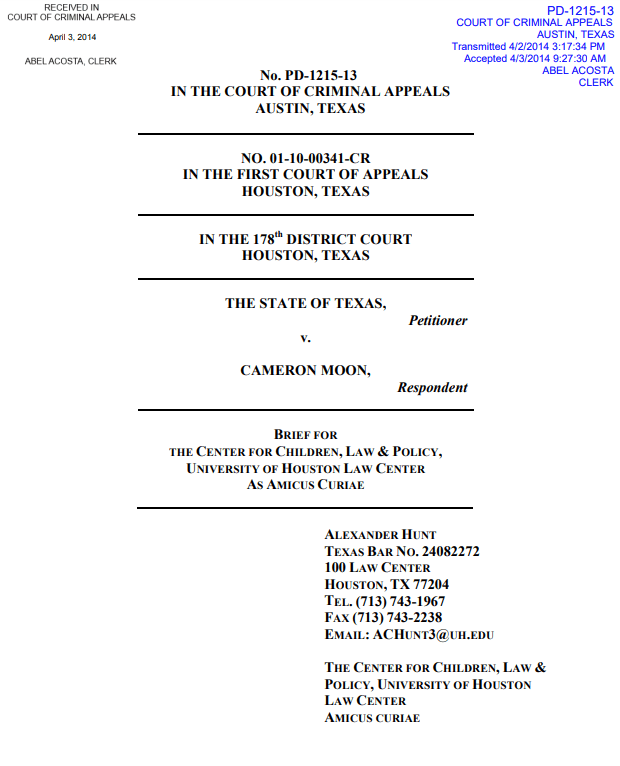
Summary of Argument
The juvenile court in Texas may waive its exclusive jurisdiction and transfer a child for prosecution in the adult criminal justice system only in those rare circumstances where the procedural protections of Section 54.02 of the Texas Juvenile Justice Code are satisfied. To permit courts to ignore the strict requirements of this statutory scheme fundamentally alters the balance between our juvenile justice and criminal justice systems and deprives similarly situated children of the process of law they are due. Where, as here, the procedural protections of Section 54.02 of the Texas Juvenile Justice Code are a surrogate for the substantive constitutional rights recognized by the Texas and United States Supreme Court, the erosion of those protections requires strict enforcement and redress. As the U.S. Supreme Court has consistently recognized, in a line of cases beginning with Kent v. United States, through Roper v. Simmons and Graham v. Florida, and in the most recent juvenile case, Miller v. Alabama, juveniles are fundamentally different from adults and must be afforded special procedural protections as a matter of due process. National organizations that represent the interests of physicians, psychiatrists, psychologists, and social workers submitted briefs to the U.S. Supreme Court as amici curiae detailing the differences between juveniles and adults identified through extensive brain science research.
Section 54.02 is the statutory embodiment of these constitutional protections and requires strict oversight and enforcement to ensure compliance. If the Texas legislature has enacted statutes formally recognizing the inherent difference between adults and children, then the Courts must ensure that children are treated fairly as children. Where these protections are ignored, the legislative intent in establishing exclusive jurisdiction in the juvenile court is frustrated, and the due process rights of Cameron Moon and all similarly situated children in Harris County are fundamentally undermined. If this Court remands to the juvenile court, clear guidance must be provided to the juvenile court to satisfy these requirements.
In addition, the remedy fashioned by this Court should be sufficient to address the systemic effects of the pattern and practice of disregarding the procedural protections of Section 54.02. Harris County has a culture of rubberstamping waivers of jurisdiction over children without thorough consideration of the child’s unique circumstances as required by Texas Family Code § 54.02. In its statutory scheme, the Texas legislature indicates an intent to protect the rehabilitative purpose of the juvenile system and balance that against the punitive and deterrent purposes of the criminal justice system when unique circumstances warrant it. The legislature could have implemented a direct file method of charging children in adult court, as other jurisdictions have, but chose not to. The legislature also could have created a statutory exclusion present in other jurisdictions. Neither direct file nor statutory exclusion laws require a hearing as does the judicial waiver process adopted by the Texas legislature. The legislature further imbued the hearing procedure with requirements mandating that the hearing be meaningful. Where, as here, that meaningful hearing is denied, the affected child must be provided one now, even if the necessary result is vacating the conviction.